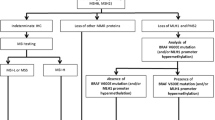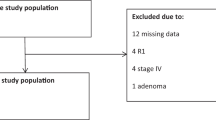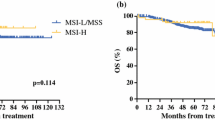Abstract
Purpose
Colon cancer with DNA mismatch repair (MMR) defects reveals indistinguishable clinical and pathologic aspects, including better prognosis and reduced response to 5-fluorouracil (5-FU)-based chemotherapy. There has been no consensus for p53 as a prognostic marker in colorectal cancer. This study investigated the clinical implication of MSI-H/MMR-D and p53 expression in R0-resected colon cancer patients who received adjuvant oxaliplatin/5-FU/leucovorin (FOLFOX) therapy.
Experimental design
We analyzed 135 patients, who had been treated by adjuvant chemotherapy containing 5-FU and oxaliplatin (FOLFOX) after curative resection (R0) for colon adenocarcinoma between May 2004 and November 2007. Tumor expression of the MMR proteins, MLH1 and MSH2, was detected by immunohistochemistry (IHC) in surgically resected tumor specimens. MSI was analyzed by polymerase chain reaction (PCR) amplification using fluorescent dye-labeled primers specific for microsatellite loci. Tumors with MMR defects were defined as those demonstrating loss of MMR protein expression (MMR-D) and/or microsatellite instability high (MSI-H) genotype. Expression patterns of p53 were determined in a semiquantitative manner by light microscopy.
Results
There were 13 (9.6%) patients with stage II, 108 (80%) with stage III, and 14 (10.4%) with stage IV. Fourteen patients with stage IV (10.3%) had metastases to liver only, all of whom underwent complete metastasectomy for liver metastases. In total, 134 tumor specimens were genotyped, 115 specimens were tested by IHC and 113 cases had both genotyping and IHC results available for analysis. Genotyping results demonstrated that 12 (9.0%) cases were MSI-H and 122 (91.0%) were MSI-L/S. By IHC, 11 (9.6%) patients were MMR-D and 104 (90.4%) were MMR-I. The methods were in agreement in 108 patients (94.7%). We assessed 114 patients for p53 expression by immunostaining. MMR status was not significantly associated with DFS (P = 0.56) or OS (P = 0.61) in patients with colon cancer (n = 135) receiving adjuvant FOLFOX. According to p53 status, there was also no significant difference for DFS (P = 0.11) and OS (P = 0.94). For patients with genotyping/IHC agreement (n = 108), there was no difference in DFS (P = 0.57) and OS (P = 0.98) between patients with MSI-H/MMR-D and MSI-L/S/MMR-I tumors.
Conclusion
The MMR status or p53 positivity was not significantly associated with outcomes to FOLFOX as adjuvant chemotherapy in colon cancer patients with R0 resection. Adding oxaliplatin in adjuvant chemotherapy may overcome negative impact of 5-FU on colon cancers with MSI-H/MMR-D.


Similar content being viewed by others
Abbreviations
- MMR:
-
DNA mismatch repair
- MMR-D:
-
MMR-deficient
- MMR-I:
-
MMR-intact
- MSI:
-
The microsatellite instability
- MSI-H:
-
High levels of MSI
- MSI-L:
-
MSI-low
- MSS or MSI-S:
-
MSI-stable
References
Aaltonen LA, Peltomaki P, Leach FS, Sistonen P, Pylkkanen L, Mecklin JP, Jarvinen H, Powell SM, Jen J, Hamilton SR et al (1993) Clues to the pathogenesis of familial colorectal cancer. Science 260:812–816
Aebi S, Kurdi-Haidar B, Gordon R, Cenni B, Zheng H, Fink D, Christen RD, Boland CR, Koi M, Fishel R, Howell SB (1996) Loss of DNA mismatch repair in acquired resistance to cisplatin. Cancer Res 56:3087–3090
Allegra CJ, Parr AL, Wold LE, Mahoney MR, Sargent DJ, Johnston P, Klein P, Behan K, O’Connell MJ, Levitt R, Kugler JW, Tria Tirona M, Goldberg RM (2002) Investigation of the prognostic and predictive value of thymidylate synthase, p53, and Ki-67 in patients with locally advanced colon cancer. J Clin Oncol 20:1735–1743
Anthoney DA, McIlwrath AJ, Gallagher WM, Edlin AR, Brown R (1996) Microsatellite instability, apoptosis, and loss of p53 function in drug-resistant tumor cells. Cancer Res 56:1374–1381
Barratt PL, Seymour MT, Stenning SP, Georgiades I, Walker C, Birbeck K, Quirke P (2002) DNA markers predicting benefit from adjuvant fluorouracil in patients with colon cancer: a molecular study. Lancet 360:1381–1391
Bertagnolli MM, Niedzwiecki D, Compton CC, Hahn HP, Hall M, Damas B, Jewell SD, Mayer RJ, Goldberg RM, Saltz LB, Warren RS, Redston M (2009) Microsatellite instability predicts improved response to adjuvant therapy with irinotecan, fluorouracil, and leucovorin in stage III colon cancer: cancer and leukemia group B protocol 89803. J Clin Oncol 27:1814–1821
Brown R, Hirst GL, Gallagher WM, McIlwrath AJ, Margison GP, van der Zee AG, Anthoney DA (1997) hMLH1 expression and cellular responses of ovarian tumour cells to treatment with cytotoxic anticancer agents. Oncogene 15:45–52
Lim CY, Kim JW, Song IH, Cho JH, Choi SB (1998) bcl-2 and p53 gene expression in colonic adenoma and carcinoma. J Korean Cancer Assoc 30:88–99
Choe WH, Lee SY, Lee JH, Shim SG, Kim YH, Rhee PL, Rhee JC, Ki CS, Kim JW, Song SY, Kim JJ (2005) High frequency of microsatellite instability in intestinal-type gastric cancer in Korean patients. Korean J Intern Med 20:116–122
Fink D, Nebel S, Aebi S, Zheng H, Cenni B, Nehme A, Christen RD, Howell SB (1996) The role of DNA mismatch repair in platinum drug resistance. Cancer Res 56:4881–4886
Fink D, Zheng H, Nebel S, Norris PS, Aebi S, Lin TP, Nehme A, Christen RD, Haas M, MacLeod CL, Howell SB (1997) In vitro and in vivo resistance to cisplatin in cells that have lost DNA mismatch repair. Cancer Res 57:1841–1845
Gervaz P, Bucher P, Morel P (2004) Two colons-two cancers: paradigm shift and clinical implications. J Surg Oncol 88:261–266
Gervaz P, Cerottini JP, Bouzourene H, Hahnloser D, Doan CL, Benhattar J, Chaubert P, Secic M, Gillet M, Carethers JM (2002) Comparison of microsatellite instability and chromosomal instability in predicting survival of patients with T3N0 colorectal cancer. Surgery 131:190–197
Gradia S, Acharya S, Fishel R (2000) The role of mismatched nucleotides in activating the hMSH2-hMSH6 molecular switch. J Biol Chem 275:3922–3930
Gryfe R, Kim H, Hsieh ET, Aronson MD, Holowaty EJ, Bull SB, Redston M, Gallinger S (2000) Tumor microsatellite instability and clinical outcome in young patients with colorectal cancer. N Engl J Med 342:69–77
Haydon AM, Jass JR (2002) Emerging pathways in colorectal-cancer development. Lancet Oncol 3:83–88
Herman JG, Baylin SB (2003) Gene silencing in cancer in association with promoter hypermethylation. N Engl J Med 349:2042–2054
Herman JG, Umar A, Polyak K, Graff JR, Ahuja N, Issa JP, Markowitz S, Willson JK, Hamilton SR, Kinzler KW, Kane MF, Kolodner RD, Vogelstein B, Kunkel TA, Baylin SB (1998) Incidence and functional consequences of hMLH1 promoter hypermethylation in colorectal carcinoma. Proc Natl Acad Sci USA 95:6870–6875
Ionov Y, Peinado MA, Malkhosyan S, Shibata D, Perucho M (1993) Ubiquitous somatic mutations in simple repeated sequences reveal a new mechanism for colonic carcinogenesis. Nature 363:558–561
Jass JR, Do KA, Simms LA, Iino H, Wynter C, Pillay SP, Searle J, Radford-Smith G, Young J, Leggett B (1998) Morphology of sporadic colorectal cancer with DNA replication errors. Gut 42:673–679
Jass JR, Whitehall VL, Young J, Leggett BA (2002) Emerging concepts in colorectal neoplasia. Gastroenterology 123:862–876
Kat A, Thilly WG, Fang WH, Longley MJ, Li GM, Modrich P (1993) An alkylation-tolerant, mutator human cell line is deficient in strand-specific mismatch repair. Proc Natl Acad Sci USA 90:6424–6428
Kim GP, Colangelo LH, Wieand HS, Paik S, Kirsch IR, Wolmark N, Allegra CJ (2007) Prognostic and predictive roles of high-degree microsatellite instability in colon cancer: a National Cancer Institute-National Surgical Adjuvant Breast and Bowel Project Collaborative Study. J Clin Oncol 25:767–772
Lothe RA, Peltomaki P, Meling GI, Aaltonen LA, Nystrom-Lahti M, Pylkkanen L, Heimdal K, Andersen TI, Moller P, Rognum TO et al (1993) Genomic instability in colorectal cancer: relationship to clinicopathological variables and family history. Cancer Res 53:5849–5852
Miyakura Y, Sugano K, Akasu T, Yoshida T, Maekawa M, Saitoh S, Sasaki H, Nomizu T, Konishi F, Fujita S, Moriya Y, Nagai H (2004) Extensive but hemiallelic methylation of the hMLH1 promoter region in early-onset sporadic colon cancers with microsatellite instability. Clin Gastroenterol Hepatol 2:147–156
Munro AJ, Lain S, Lane DP (2005) P53 abnormalities and outcomes in colorectal cancer: a systematic review. Br J Cancer 92:434–444
Nehls O, Okech T, Hsieh CJ, Enzinger T, Sarbia M, Borchard F, Gruenagel HH, Gaco V, Hass HG, Arkenau HT, Hartmann JT, Porschen R, Gregor M, Klump B (2007) Studies on p53, BAX and Bcl-2 protein expression and microsatellite instability in stage III (UICC) colon cancer treated by adjuvant chemotherapy: major prognostic impact of proapoptotic BAX. Br J Cancer 96:1409–1418
Petersen S, Thames HD, Nieder C, Petersen C, Baumann M (2001) The results of colorectal cancer treatment by p53 status: treatment-specific overview. Dis Colon Rectum 44:322–333 discussion 333-4
Plumb JA, Strathdee G, Sludden J, Kaye SB, Brown R (2000) Reversal of drug resistance in human tumor xenografts by 2′-deoxy-5-azacytidine-induced demethylation of the hMLH1 gene promoter. Cancer Res 60:6039–6044
Popat S, Hubner R, Houlston RS (2005) Systematic review of microsatellite instability and colorectal cancer prognosis. J Clin Oncol 23:609–618
Ribic CM, Sargent DJ, Moore MJ, Thibodeau SN, French AJ, Goldberg RM, Hamilton SR, Laurent-Puig P, Gryfe R, Shepherd LE, Tu D, Redston M, Gallinger S (2003) Tumor microsatellite-instability status as a predictor of benefit from fluorouracil-based adjuvant chemotherapy for colon cancer. N Engl J Med 349:247–257
Schernhammer ES, Ogino S, Fuchs CS (2008) Folate and vitamin B6 intake and risk of colon cancer in relation to p53 expression. Gastroenterology 135:770–780
Soreide K, Janssen EA, Soiland H, Korner H, Baak JP (2006) Microsatellite instability in colorectal cancer. Br J Surg 93:395–406
Strathdee G, Appleton K, Illand M, Millan DW, Sargent J, Paul J, Brown R (2001) Primary ovarian carcinomas display multiple methylator phenotypes involving known tumor suppressor genes. Am J Pathol 158:1121–1127
Strathdee G, MacKean MJ, Illand M, Brown R (1999) A role for methylation of the hMLH1 promoter in loss of hMLH1 expression and drug resistance in ovarian cancer. Oncogene 18:2335–2341
Thibodeau SN, Bren G, Schaid D (1993) Microsatellite instability in cancer of the proximal colon. Science 260:816–819
Wolpin BM, Meyerhardt JA, Mamon HJ, Mayer RJ (2007) Adjuvant treatment of colorectal cancer. CA Cancer J Clin 57:168–185
Acknowledgments
This study was supported by the Korea Health 21 R&D Project, Ministry of Health and Welfare, Republic of Korea (Grant No. 0412-CR01-0704-0001).
Author information
Authors and Affiliations
Corresponding authors
Rights and permissions
About this article
Cite this article
Kim, S.T., Lee, J., Park, S.H. et al. Clinical impact of microsatellite instability in colon cancer following adjuvant FOLFOX therapy. Cancer Chemother Pharmacol 66, 659–667 (2010). https://doi.org/10.1007/s00280-009-1206-3
Received:
Accepted:
Published:
Issue Date:
DOI: https://doi.org/10.1007/s00280-009-1206-3




